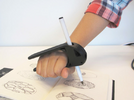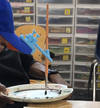Old thread or not, I think this is a worthwhile effort.
My wife is an artist and she is becoming blind with macular degeneratin, as well as losing dexterity in her hands because of her health conditions. These conditions impact her ability to draw, paint, and throw clay for pottery. It would certainly benefit thousands, if not millions, of people to have at least their hands "assisted" somehow.
I am thinking of those
remote manipulators used to handle radioactive and other hazardous materials behind a protective barrier. Although, originally, remote manipulators were strictly mechanical and rather crude in their ability to grab, hold, and rotate objects, I think the state-of-the-art today (21st Century) allows a "virtual reality" approach using video and small electro-mechanical "manipulators" to do all sorts of tasks requiring precision movements, not just soldering but also anything requiring advanced vision (magnification, 3D imaging, spectral transformation, hyperspectral imaging, etc.).
Size can be almost anything. I have seen, and used, X-Y microscope stage manipulators that use mechanical linkages to translate large joy-stick motions into minute stage motions. Great for locating areas of interest on a specimen slide or finding small components on a circuit board. Something similar, with the added ability to move up and down, would help me to place and solder tiny surface-mount components. Problem is, this technology is not inexpensively available at my local big-box appliance store. If I want something like this, I will have to design and build it myself.
So, instead of a new soldering iron (of which there are already plenty), perhaps all we need is a new way to use that tool. I have personally been "playing around" with soldering surface-mounted components for a few years now. My vision and dexterity would probably be much improved with the aid of a long working-distance, low-magnification, zoom optic,
digital video microscopic imaging device and steadier hands. Stereo microscopes of course are readily available, if one has sufficient resources, but I have not found one (not even used!) that I can afford to purchase. A stereo television image using a pair of CCD image sensors with a head-mounted image display might be an alternative if it were paired with a set of micro-manipulators.
Before electronics technicians are all replaced with AI-driven robots, perhaps someone here can offer a solution that would allow human beings to perform most if not all of those tasks, albeit at a slower and more error-prone rate...
73 de AC8NS -- Hop




